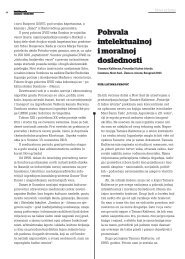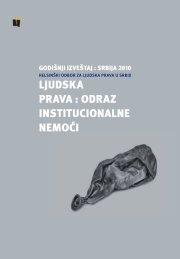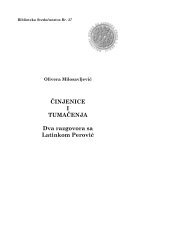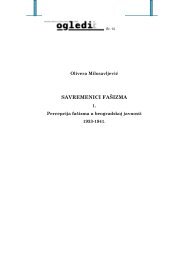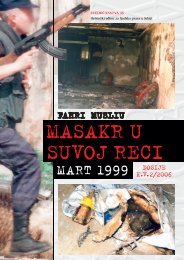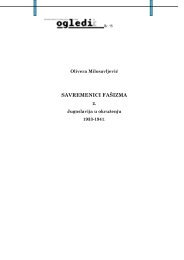Human Rights: Hostage To the State's Regression - Helsinki ...
Human Rights: Hostage To the State's Regression - Helsinki ...
Human Rights: Hostage To the State's Regression - Helsinki ...
You also want an ePaper? Increase the reach of your titles
YUMPU automatically turns print PDFs into web optimized ePapers that Google loves.
<strong>Helsinki</strong> Committee for <strong>Human</strong> <strong>Rights</strong> in Serbia<br />
<strong>Human</strong> <strong>Rights</strong>: <strong>Hostage</strong> <strong>To</strong> <strong>the</strong> <strong>State's</strong> <strong>Regression</strong><br />
IV<br />
SOCIOECONOMIC PROCESSES<br />
• “Pre-Election” Economy ……………………………………………… 231<br />
• Economic and Social <strong>Rights</strong> ……………………….............................. 243<br />
• Healthcare System Bypasses Social Needs ......................................... 255<br />
• People on Social Margins ...................................................................... 275<br />
• Education: Excesses Instead of Reform …………………………… 292<br />
V<br />
DECENTRALIZATION: A DEVELOPMENTAL IMPERATIVE<br />
• Vojvodina – From High Hopes to Boycott .......................................... 309<br />
• Sandzak in a Trap ……………………………………………………... 339<br />
VI<br />
KOSOVO STATUS: THE FINAL STAGE<br />
• The Attempt to Postpone Resolution Fails ……………..................... 363<br />
VII<br />
MINORITIES ON THE MARGINS OF THE SOCIETY<br />
• Minorities Anxious About Dissolution of <strong>the</strong> State Union .............. 383<br />
VIII<br />
FOREIGN POLICY STAGNATES<br />
• Between East and West ………………….............................................. 425<br />
• Serbia and Croatia: Rivalrous Relations .............................................. 436<br />
• Serbia and Bosnia-Herzegovina: Denied Crimes Weight Mutual<br />
Relations ………………………………………………………………... 444<br />
• Slovenia Mediates in Regional Stabilization ………………………... 449<br />
• Montenegro Becomes Independent …………………………………. 452<br />
ANNEX<br />
• <strong>Helsinki</strong> Committee for <strong>Human</strong> <strong>Rights</strong> in Serbia – Press Releases . 477<br />
• Documentary Serial ................................................................................ 497<br />
• Publishing ................................................................................................ 501<br />
CONCLUSIONS AND RECOMMENDATIONS<br />
All segments of Serbia’s political, economic and social life stagnated in<br />
2006. Serbia’s overall situation is ra<strong>the</strong>r to be ascribed to <strong>the</strong> fact that her<br />
institutions have been devastated and her social tissue destroyed over <strong>the</strong> past<br />
20 years. This major dimension of Serbia’s reality was nei<strong>the</strong>r appreciated nor<br />
objectively assessed at <strong>the</strong> time of Slobodan Milosevic’s ouster. Besides, <strong>the</strong><br />
criminal legacy of <strong>the</strong> 1990s wars that nowadays hinder <strong>the</strong> society’s<br />
democratic transition and facing <strong>the</strong> recent past was disregarded. All this<br />
resulted in self-isolation and fueled <strong>the</strong> concept of “a neutral” Serbia with<br />
reliance on Russia. <strong>To</strong>day’s concept of transitional justice has been exhausted<br />
when it comes to present-day Serbia and her poor potential.<br />
Objective limitations also condition Serbia’s movement towards<br />
European integrations, <strong>the</strong> European Union in <strong>the</strong> first place. As a failed<br />
transitional country facing numerous demands, Serbia is incapable of meeting<br />
European standards and criteria. Her new political and financial class<br />
(tycoons) would not let go yet <strong>the</strong> positions acquired over <strong>the</strong> past 20 years. As<br />
it turned out, pressures and <strong>the</strong> policy of conditioning are no longer effective<br />
in Serbia’s case as her political elite is not truly willing to join Europe but ready<br />
to sacrifice Serbia’s future place in it instead.<br />
Serbia was totally deinstitutionalized in early 2007 after <strong>the</strong><br />
parliamentary election. In spite of <strong>the</strong> clear-cut electoral outcome and popular<br />
vote, <strong>the</strong> lowest-ranking of <strong>the</strong> three leading political parties, <strong>the</strong> Democratic<br />
Party of Serbia – presently without legality and legitimacy – still holds <strong>the</strong><br />
reins of political and social developments with <strong>the</strong> support of informal centers<br />
of power. This at <strong>the</strong> same time testifies that Serbia functions as a “façade<br />
democracy.”<br />
The media still play a problematic role in Serbia. The matrix of <strong>the</strong>ir<br />
reporting has not changed. None of <strong>the</strong> issues that had brought about <strong>the</strong><br />
1990s wars – and today dominate Serbia’s politics (<strong>the</strong> Serbian national<br />
program, borders, Kosovo, neighbors, etc.) have been opened to question. The<br />
media keep deluding <strong>the</strong> general public that <strong>the</strong> Serbian national program of<br />
early 1990s is still alive. Maintenance of such public opinion stands in <strong>the</strong> way<br />
of regional normalization.<br />
Serbia’s disintegration nears <strong>the</strong> dangerous point at which she would<br />
be left without a mainstay for social and institutional consolidation. Once <strong>the</strong><br />
6<br />
7



